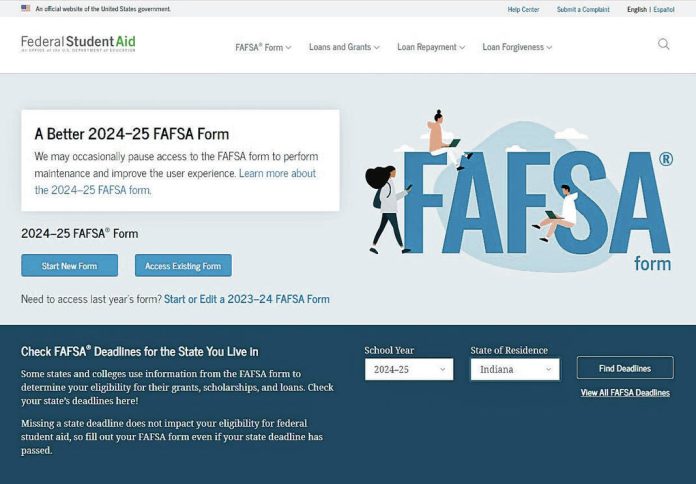A revamped Free Application for Federal Student Aid was supposed to be a shorter, simpler version of the application. But its rollout has caused local schools to scramble to get students to sign up.
Leading up to and during the soft launch Dec. 31, minor issues in the application process caused delays. Some students whose parents don’t have Social Security numbers were not able to apply until a Feb. 20 update fixed it.
The FAFSA form was updated to allow applicants to securely transfer their federal tax information directly from the IRS, removing a “burdensome” and “confusing” step for applicants, according to the Department of Education. It would also extend Federal Pell Grants to more than half a million students from low-income backgrounds.
However, data shows technical difficulties surrounding the form have caused a slow start for the class of 2024.
As of Feb. 9, 21.1% of high school seniors in Indiana have submitted an application, a 38% decrease compared to last academic year, according to data from the National College Attainment Network, a nonprofit dedicated to closing equity gaps in higher education. Even the network’s FAFSA Tracker is experiencing issues because of the delay, their website says. In previous years, the tracker would show the number of completions, but due to the delay, it can only provide the number of submissions this year.
Johnson County school districts are also seeing a slower pace of submissions.
Compared to this time last year, there is an 18.5% decrease in students filing the FAFSA at Greenwood and Whiteland high schools. Other local public high schools have an even sharper decrease compared to last year: 26% for Franklin, 37.8% for Center Grove, 41.2% for Edinburgh and 50.8% for Indian Creek.
Getting students signed up has been “pretty stressful,” said Ben Sutton, counselor at Greenwood Community High School. The difficult part has been trying to advertise resources to students while updates and bug fixes were still rolling out, Sutton said. A lot of students’ questions had to go unanswered due to lack of information, he said.
“The counseling department is kind of a place that most people come to for answers,” Sutton said. “So we generally struggle when we don’t have those answers.”
Many area schools partner with INvestED — a Carmel-based organization that helps Hoosier students access higher education — to host events and answer questions to streamline the process. Generally, questions that counselors couldn’t answer, INvestED could. But even with INvestED’s help, some questions couldn’t be answered, he said.
“The rollout hasn’t been seamless,” Sutton said. “There’s situations where students come down and just some odd things have happened. And you don’t really know why.”
By now, counselors would have access to the state’s ScholarTrack portal where they can track financial aid information to students. Because of the late rollout, information won’t be available in ScholarTrack until the first half of March, said Laura Ehringer, college counselor at Whiteland Community High School.
Until then, Ehringer has no idea what students have signed up for the FAFSA and what students she needs to target to get signed up. Schools are “down to the wire,” trying to get everyone signed up before the state’s April 15 priority deadline, she said.
The Indiana Commission for Higher Education has set a goal to have at least 60% of high school seniors complete the application process by Indiana’s April 15 priority deadline. Students can file after the deadline, but funding won’t be guaranteed, which means families could lose out on thousands of dollars, according to INvestED.
All of the hiccups have been easily fixed, but the process is putting mounting pressure on colleges to process applications and issue financial aid to students too, she said. Dozens of colleges, including the University of Indianapolis, have extended their deadline for students to commit to their institution due to the delays.
Some families at Center Grove High School have had troubles with the roll out, said Meaghan Krukemeier, director of guidance. Students have had trouble accessing the new feature to transfer federal tax data directly to the application, she said.
“This was supposed to be easier for everybody and they’re finding out it’s not,” Krukemeier said.
Other schools have local scholarships waiving their FAFSA requirements because students haven’t been able to file, said Amber Burton, a counselor at Indian Creek High School.
“We host two events every year in order to encourage families to file their FAFSA and we actually had to move our December meeting to January because nothing with the FAFSA was ready for families to begin applying,” Burton said.
The federal Government Accountability Office has opened at least two investigations into the handling of the FAFSA rollout. U.S. Department of Education officials plan to visit campuses and open up $50 million of federal funding to help colleges manage FAFSA issues, POLITICO reported.





